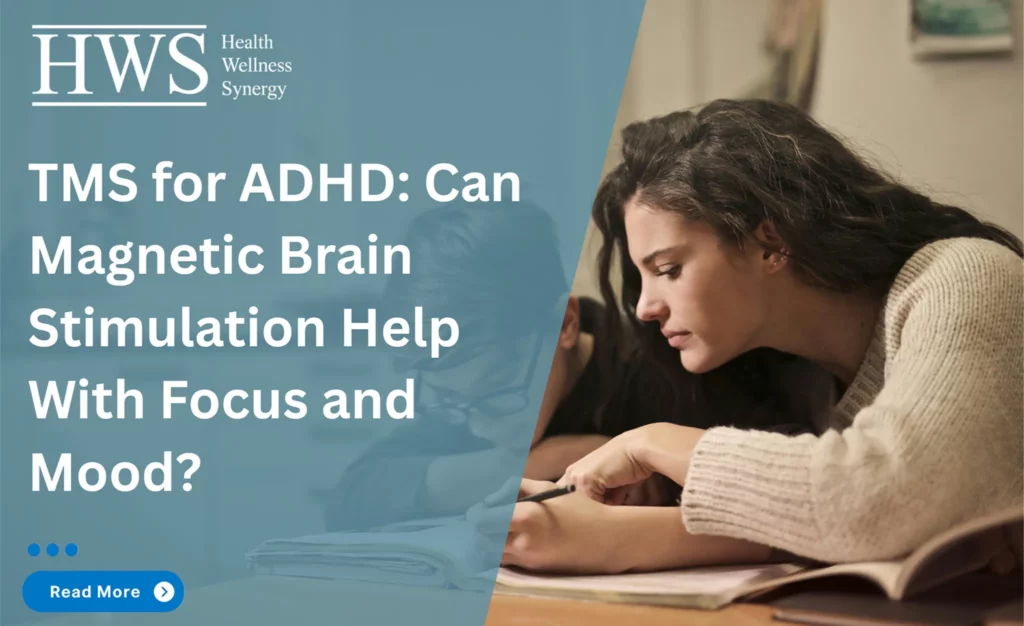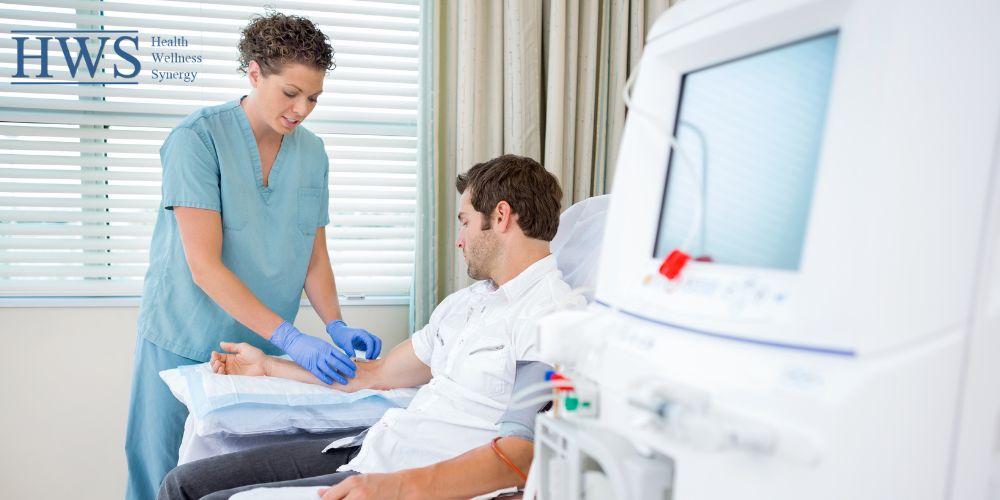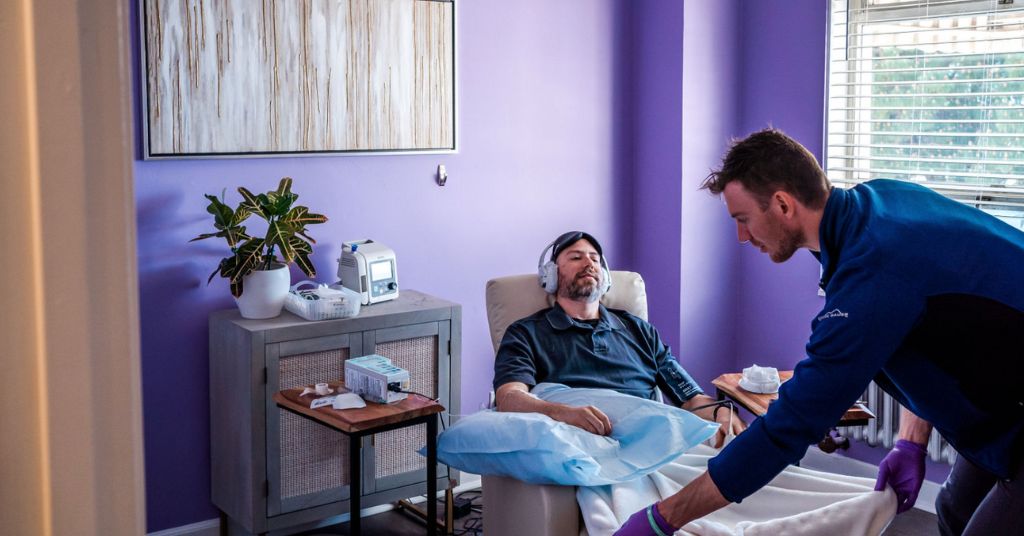
Attention-Deficit/Hyperactivity Disorder (ADHD) is more than occasional distraction or restlessness. It is a neurodevelopmental condition that affects focus, organization, impulse control, and emotional regulation. Many children and adults with ADHD also experience coexisting challenges such as anxiety, depression, or sleep problems.
Traditional treatments like stimulant medications and behavioral therapy are effective for many people, but not everyone responds well. Some patients find medications cause unwanted side effects, while others need additional support to improve daily functioning. This is why interest in alternative treatments such as TMS for ADHD has grown in recent years.
Transcranial Magnetic Stimulation (TMS) is a non-invasive therapy that uses magnetic pulses to stimulate targeted regions of the brain. These areas are responsible for attention, mood regulation, and executive functioning. By influencing neural pathways, TMS may help rebalance brain activity that is disrupted in individuals with ADHD.
If you’re searching for TMS Near Me, it’s important to choose a provider that offers safe, effective treatment in a supportive environment. Unlike medications, TMS does not circulate through the bloodstream, and it does not cause systemic side effects. Sessions are performed in an outpatient setting, and patients can return to school, work, or daily life immediately afterward.
TMS is best known as an FDA-approved therapy for major depressive disorder, but research is expanding into other conditions, including ADHD. Early studies suggest that magnetic brain stimulation may improve focus, reduce impulsivity, and enhance mood stability.
For patients who struggle with medication tolerance or who want a drug-free option, TMS may provide a new pathway to symptom relief. Parents of children with ADHD are also exploring whether TMS could offer long-term benefits without the side effects associated with stimulant therapy.

A typical TMS session for ADHD begins with a consultation and brain mapping process. This helps the provider identify the exact area to stimulate. During treatment, a magnetic coil is placed gently on the scalp. The device sends controlled pulses that you may feel as a tapping sensation.
Each session lasts about 20 to 40 minutes. Most treatment plans involve multiple sessions per week for four to six weeks. The process is safe, painless, and requires no anesthesia.
Patients and researchers report several promising benefits of TMS for ADHD:
While outcomes vary from person to person, many patients notice gradual improvements after a few weeks of consistent therapy.
TMS therapy is considered very safe, especially when compared to long-term use of stimulant medications. Common side effects include mild scalp discomfort or headache, which usually resolve quickly. Serious complications are rare.
Because TMS is non-invasive and does not require medication, it is appealing to patients who want an alternative or complementary approach to ADHD treatment.

For individuals seeking advanced mental health care, clinics offering TMS for ADHD in New Jersey are making this therapy more accessible. Choosing an experienced provider ensures accurate brain mapping, safe delivery, and personalized treatment plans tailored to individual needs.
HWS Center specializes in evidence-based therapies for mental health, including TMS. Patients receive compassionate guidance from a team of professionals who understand the challenges of ADHD and the importance of individualized care.
Living with ADHD presents daily challenges that affect school, work, and relationships. While medication and therapy remain important tools, innovative options like TMS are expanding what treatment can look like.
If you’re exploring solutions for TMS ADHD, you’ll find that many patients in New Jersey view this therapy as a safe and hopeful path toward improved focus, better mood regulation, and enhanced quality of life. By working with an experienced provider, individuals and families can take the first step toward discovering how magnetic brain stimulation may help unlock potential.
Schedule a consultation! Provide your contact information below and we’ll get back to you as soon as we can.
TMS for ADHD is a non-invasive therapy that uses magnetic stimulation to target areas of the brain involved in attention, impulse control, and mood regulation. The goal is to improve focus, reduce hyperactivity, and support better emotional balance. This approach offers an alternative to traditional treatments and is gaining recognition as a safe, outpatient option for managing ADHD symptoms.
Research is still developing, but early studies and clinical observations show promising results. Many patients report improved concentration, reduced impulsivity, and greater mood stability after a course of treatment. While results vary, growing evidence suggests that TMS for ADHD can be especially beneficial for individuals who do not respond fully to medication or therapy alone.
TMS may be an alternative for individuals who do not tolerate stimulant medications or want a drug-free option. In some cases, it can be used alongside medication and behavioral therapy for a more comprehensive treatment plan. Providers often recommend combining TMS with other supportive strategies to maximize long-term outcomes for ADHD.
Most patients require daily sessions, five days per week, for four to six weeks. Each session lasts about 20 to 40 minutes. Treatment plans are personalized, and some individuals may benefit from maintenance sessions afterward to sustain progress and prevent symptom relapse.
Yes, TMS is considered safe for both adults and children when delivered by trained professionals. The most common side effects are mild scalp discomfort or temporary headaches. Safety studies continue to show that TMS is a well-tolerated option, making it appealing for families searching for non-drug ADHD treatments in New Jersey and beyond.
Some patients notice changes within the first two weeks, while others see gradual progress later in the treatment plan. Improvements may include better focus, less restlessness, and improved mood regulation. Because results build over time, it’s important to complete the full treatment schedule for the best outcomes.
We use cookies to improve your experience on our site. By using our site, you consent to cookies.
Manage your cookie preferences below:
Essential cookies enable basic functions and are necessary for the proper function of the website.
Google reCAPTCHA helps protect websites from spam and abuse by verifying user interactions through challenges.
Google Tag Manager simplifies the management of marketing tags on your website without code changes.
You can find more information in our Cookie Policy and Privacy Policy.